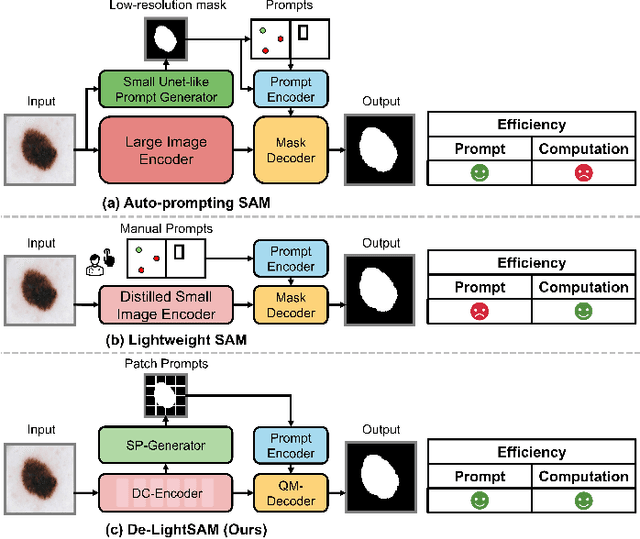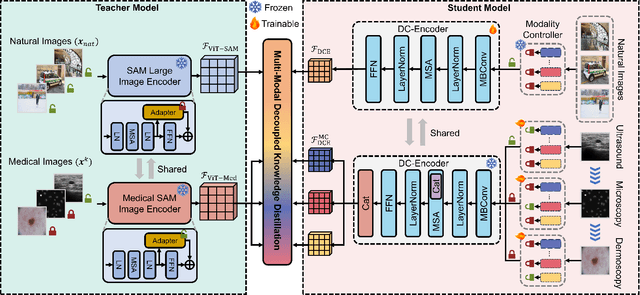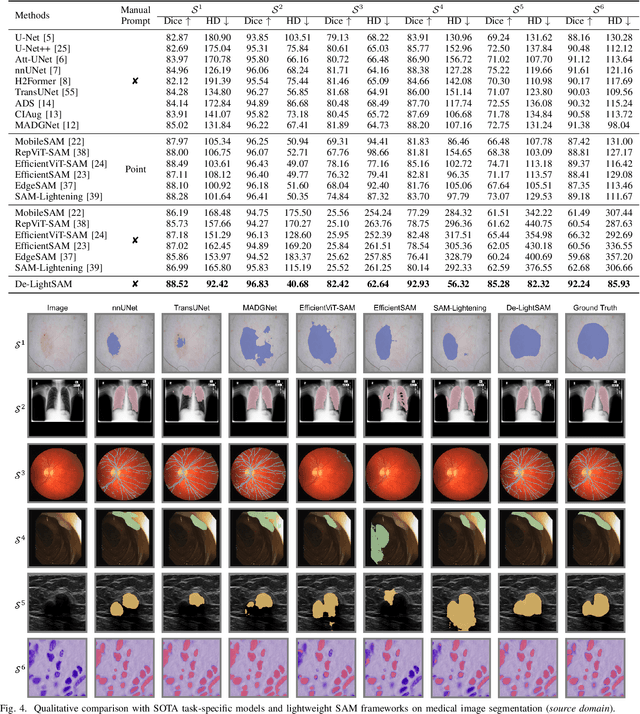Maggie M. He
NuSegDG: Integration of Heterogeneous Space and Gaussian Kernel for Domain-Generalized Nuclei Segmentation
Aug 21, 2024



Abstract:Domain-generalized nuclei segmentation refers to the generalizability of models to unseen domains based on knowledge learned from source domains and is challenged by various image conditions, cell types, and stain strategies. Recently, the Segment Anything Model (SAM) has made great success in universal image segmentation by interactive prompt modes (e.g., point and box). Despite its strengths, the original SAM presents limited adaptation to medical images. Moreover, SAM requires providing manual bounding box prompts for each object to produce satisfactory segmentation masks, so it is laborious in nuclei segmentation scenarios. To address these limitations, we propose a domain-generalizable framework for nuclei image segmentation, abbreviated to NuSegDG. Specifically, we first devise a Heterogeneous Space Adapter (HS-Adapter) to learn multi-dimensional feature representations of different nuclei domains by injecting a small number of trainable parameters into the image encoder of SAM. To alleviate the labor-intensive requirement of manual prompts, we introduce a Gaussian-Kernel Prompt Encoder (GKP-Encoder) to generate density maps driven by a single point, which guides segmentation predictions by mixing position prompts and semantic prompts. Furthermore, we present a Two-Stage Mask Decoder (TSM-Decoder) to effectively convert semantic masks to instance maps without the manual demand for morphological shape refinement. Based on our experimental evaluations, the proposed NuSegDG demonstrates state-of-the-art performance in nuclei instance segmentation, exhibiting superior domain generalization capabilities. The source code is available at https://github.com/xq141839/NuSegDG.
ESP-MedSAM: Efficient Self-Prompting SAM for Universal Domain-Generalized Medical Image Segmentation
Jul 19, 2024



Abstract:The Segment Anything Model (SAM) has demonstrated outstanding adaptation to medical image segmentation but still faces three major challenges. Firstly, the huge computational costs of SAM limit its real-world applicability. Secondly, SAM depends on manual annotations (e.g., points, boxes) as prompts, which are laborious and impractical in clinical scenarios. Thirdly, SAM handles all segmentation targets equally, which is suboptimal for diverse medical modalities with inherent heterogeneity. To address these issues, we propose an Efficient Self-Prompting SAM for universal medical image segmentation, named ESP-MedSAM. We devise a Multi-Modal Decoupled Knowledge Distillation (MMDKD) strategy to distil common image knowledge and domain-specific medical knowledge from the foundation model to train a lightweight image encoder and a modality controller. Further, they combine with the additionally introduced Self-Patch Prompt Generator (SPPG) and Query-Decoupled Modality Decoder (QDMD) to construct ESP-MedSAM. Specifically, SPPG aims to generate a set of patch prompts automatically and QDMD leverages a one-to-one strategy to provide an independent decoding channel for every modality. Extensive experiments indicate that ESP-MedSAM outperforms state-of-the-arts in diverse medical imaging segmentation takes, displaying superior zero-shot learning and modality transfer ability. Especially, our framework uses only 31.4% parameters compared to SAM-Base.
 Add to Chrome
Add to Chrome Add to Firefox
Add to Firefox Add to Edge
Add to Edge